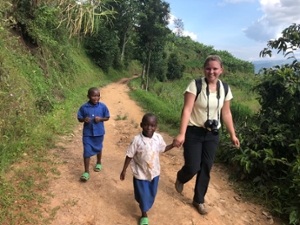Engineers Without Borders is impacting Rwanda

In May, four Miami students in Engineers Without Borders traveled to Munini, Rwanda.
Kylie Hays, Craig Hanson, Sophie Dent, and Aidan Kuhn spent nearly two weeks immersed in the community and working with the locals.
Craig Hanson, the Sanitation Project Manager, first went to Rwanda during May 2016 and was excited to go back.

Dent walking and smiling with Munini children
“I still kept in contact with lots of people I met my freshman year, and it was awesome to see everyone after two years and all the things that changed.”
This trip was not a vacation for the students. Though they did have a good time, their goals were to improve water and sanitation quality in Munini.
But it wasn’t easy.
Providing clean water access
Project Lead, Sophie Dent, had extensive plans for improving water quality when coming into the trip. She was going to oversee the creation of a handwashing station, and implement high water volume into the Gashonvi Clinic.
However, when the team arrived to Rwanda they realized that the water project at the clinic was canceled because the organization that they were working with decided to not prioritize that project, and they would have to pick a new project to do.
This new project required the team to pipe water from a collection box of six springs down to two villages. The box currently served 6,000 people in one village, and expanding the distribution to two villages would reach 1,500 more.
During this trip the team also tested water, measured the elevation change from the springs to the villages, and discussed with the local governments about the needs of the villagers.
Despite the initial challenges, the team was able to successfully start facilitating the expansion of water piping to get more communities access to clean water.
Aiding a local school
The group of students also spent there time developing sanitation practices and systems with in the Munini school. The students helped oversee the construction of a handwashing station and assess further needs.

Kuhn and children smile for a picture
For this project the team needed to attach a water tank to a rainwater collection tank and source the water to the hand washing station. However, their design faced challenges as well. When the team arrived to Rwanda the school decided to move the location of the hand washing station, making them have to rework the entire system.
Even with these setbacks the team was able to complete the majority of the system, with only the rain water tank to do on the next trip. The team was happy with the work that they completed and help service the 2,000 children that attend the Munini school.
The team plans on finishing the system and building latrines within the school by next year.
Discovering the country
Though they did spend most of their time in Rwanda working in the local communities, these students did have some opportunities to explore the beauty in Rwanda.
The team got a chance to go on a safari, where they got to explore nature, and see animals in their natural habitats. “The natural beauty of the landscape and the freedom of the animals was refreshing...compared to the busy United States,” explained Dent.
Reflecting on their experience
This trip helped students understand the importance of their actions, and how things they might take for granted daily come as a luxury in small villages as Munini. This experience allowed students to connect with the people in Munini, in addition to helping a community in need.

Beautiful landscape of Rwanda
“I felt that I was doing something incredible for these kids who have very little. This is the moment that I felt a strong connection with the people I had been working with. We did not speak the language but there are so many ways to communicate,” Dent stated about her experience.
The team of students were able to bond with the children at the school as well.
“Every day at the worksite, there would be throngs of children surrounding [them]. They were the happiest and most carefree people...and teaching them things like the macarena are memories that I will cherish forever,” Hanson stated, reflecting back on his trip.
Through the team's trip they got to realize the direct impact that their actions have on the community and how they, as Kuhn remarked, “are really making people’s lives easier.”
By Maggie Cavanaugh

